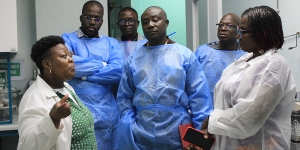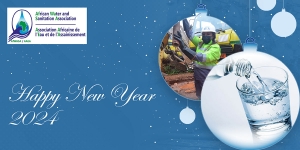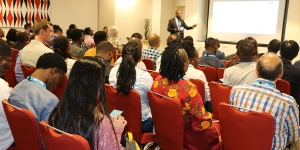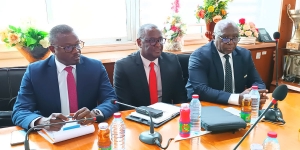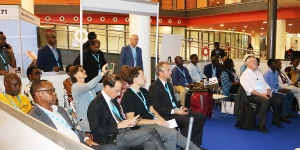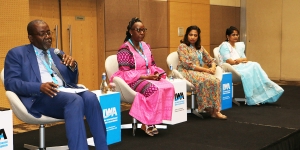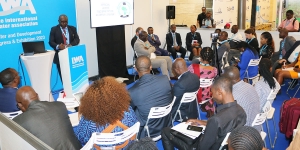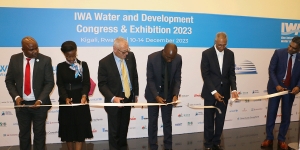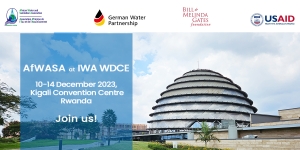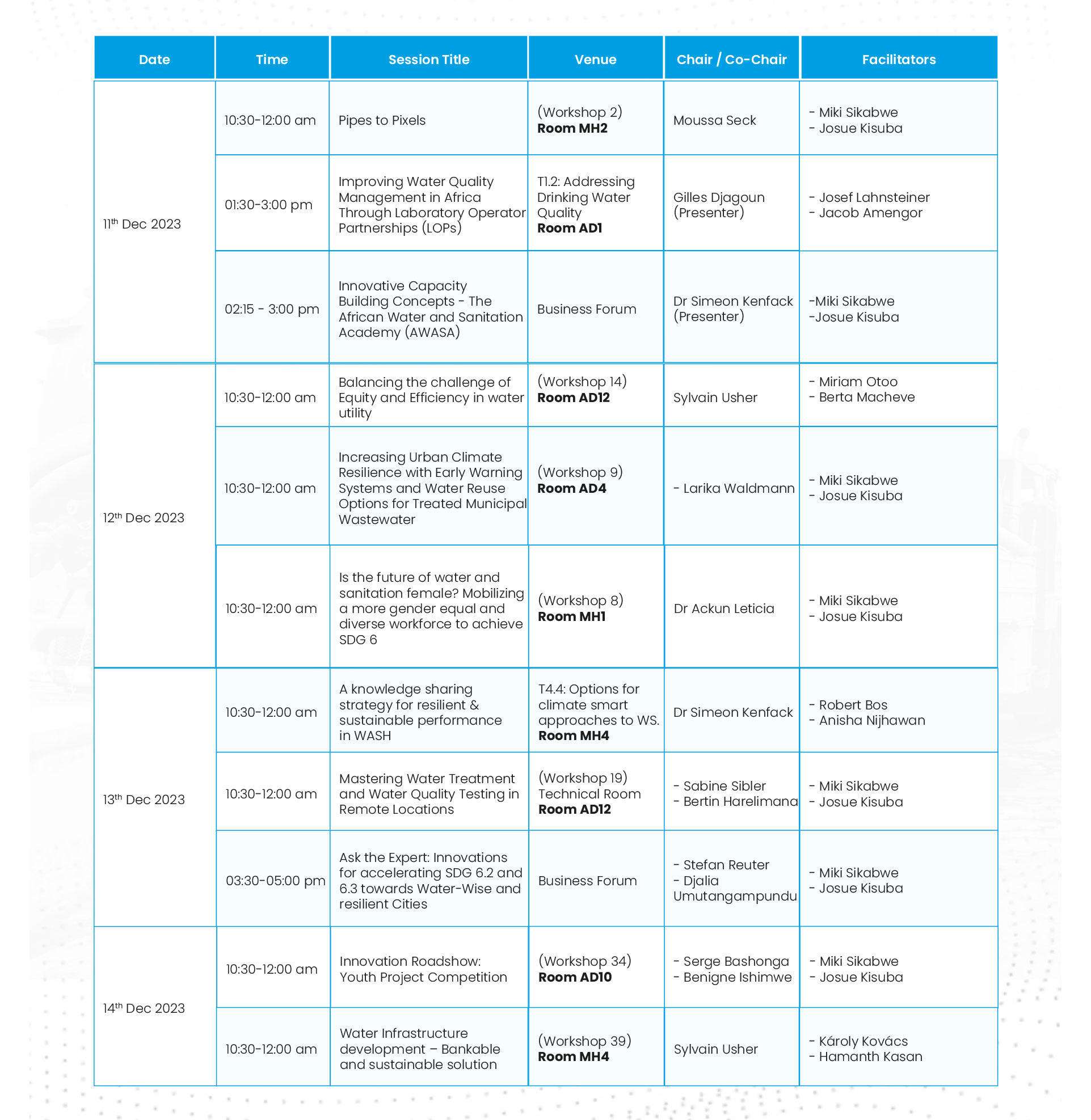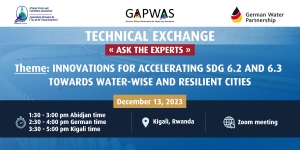Nzickonan Stéphanie
AfWASA member utilities on training and benchmarking mission to Rand Water, South Africa
As part of the implementation of the AfriCap(*) program, funded by the U.S. Agency for International Development (USAID), AfWASA has a standing MoU with Rand Water, one of South Africa's water utilities, to promote partnership in the field of drinking water production and supply.
During the week of the 18th to the 22nd of December 2023, the Scientific Services Division of Rand Water hosted delegations from various drinking water supply entities in Africa for a total of 5 days. The countries/utilities were, Ghana Water Company Limited (GWCL), Ethiopian Wolaita Sodo Town Water & Sewerage Services Enterprise (WSWSSSE) as well as National Office of Water and Sanitation (ONEA) of Burkina Faso. The purpose of the visit was to i) train the Ethiopian WSWSSSE delegation on the development of a quality manual for the first three days of the visit, followed by ii) a peer-to-peer sharing of experiences and best practices in the field of water quality testing, laboratory operating systems and water quality management for the remaining two days of the visit.
The first day started with a welcoming speech by the General Manager of Scientific Services, followed by short presentations by departmental Managers on key functions of the different departments within Rand Water. Thereafter, the delegation traveled to the Analytical Services facility in Vereeniging where the training and benchmarking mission program was introduced.
On the second and third days, a GWCL-led water quality manual training session took place for the Ethiopian delegation, which was further assisted by the Rand Water project team members. This phase concluded with the development of a framework, followed by a submission of the Ethiopian draft quality manual which will be completed by end of February 2024.
The benchmarking mission proceeded on the fourth day with the Ghana and Burkina Faso delegation, a brief visit to the Process Technology Facility in the morning and returning to the Analytical Services laboratory thereafter.
On the fifth day the delegates witnessed hands on some state-of-the-art execution of water quality testing and reporting. Presentations of various laboratory processes and equipment used emphasized the importance of water quality management and the protection of public health. Robust discussions on common interests ensued with Rand Water Analytical Services highlighting best practices suitable for a water quality testing. The visit closed on a high note where a framework on a laboratory quality manual was developed, which will be complimented by a continued collaboration and exchange on matters of interest, including participation in proficiency testing schemes (PTS).
(*) AfriCap or AfWASA Capacity Building Program aims to support the Association in its mandate to build the capacity of African stakeholders in the water, sanitation and hygiene sector, through the dissemination of knowledge and best practices, and peer-to-peer learning partnerships.
AfWASA wishes you a Happy Holiday Season!
Dear Members,
Dear Partners,
In this time of celebration, we'd like to take a moment to express our gratitude and warm wishes to you. Merry Christmas and Happy New Year to you and your loved ones!
May this festive season be filled with joy, love, and shared precious moments. May the coming year bring you health, happiness, and success in all your endeavors.
We are grateful to have outstanding members and partners like you. Thank you for your dedication, support, and enthusiasm.
Wishing you a Happy Season and a Prosperous New Year!
Sincerely,
AfWASA Team
Peer-to-peer partnerships, key to improving water quality in Africa
As part of the Water and Development Congress held in Kigali from December 10th -14th, 2023, AfWASA took part on December 11, in a session on the challenges of water quality and the effectiveness of water treatment methods. On this occasion, the peer-to-peer partneships of its capacity Building Programme (Africap) funding by USAID was presented as key to improving water quality in Africa.
The presentation was made by Gilles Djagoun, AfWASA Senior Water Program Coordinator, in charge of the Africap programme. He explained that the main objective of the programmes is to support AfWASA to achieve its broad mandate in capacity building of African WASH stakeholders through among others, dissemination of knowledge and Peer-to-peer learning partnership. He highlighted the successful experiences of peer-to-peer partnerships between high-performance water quality analysis and control laboratories (mentors) and those that are less so (mentees), which are contributing to a significant improvement in water quality management in Africa.
Several activities are conducted within the framework of the program, including trainings, laboratory audits, benchmarking visits, support in producing a laboratory management manual, and twinning and drafting performance improvement plans. Participating laboratories are from Cameroon, Ghana, Nigeria, Côte d'Ivoire, Guinea, Niger, Mali, Togo, and Burkina Faso. They took part in several activities, including
In terms of results, the project has led to a clear improvement in the management of the above-mentioned laboratories, a positive impact on the quality of water, the construction of reference laboratories, and the achievement of iso certification for some of them.
Through this program, AfWASA is demonstrating its commitment to supporting the Africa Water Vision 2025, which calls for "equitable and sustainable use of water for socio-economic development".
It should be noted that the USAID-funded AfriCap program runs from 2015-2023.
Water quality control: CAMWATER aims to meet international standards
With a view to bringing Cameroon Water Utilities Corporation (CAMWATER) water quality control procedures in line with international standards, the General Management has decided to set up a quality management system that will enable ISO certification and the construction of an accredited laboratory.
To this end, CAMWATER, under the auspices of AfWASA, requested the support of SODECI to manage this project. To this end, an AfWASA exploratory mission led by the Director of Programs, Dr Siméon Kenfack, Dr Stéphane Claon, Director of the Water Quality Control Laboratory at the Office National de l'Eau Potable in Côte d'Ivoire, and Francis Kéré, Director at the Office National de l'Eau et de l'Assainissement in Burkina Faso, met the CAMWATER's project team in Douala, to visit potential project sites, and prepare its benchmarking mission to Côte d'Ivoire.
A roadmap is expected at the end of the mission. This should clearly define, among other things, the objectives to be achieved, the resources to be used, the targets, the activities, the timeline...
Ask the Experts 9: African and German experts present innovations for water-wise and resilient cities
The 9th edition of the "ask the experts" series, the technical exchange session between German and African experts in the water and sanitation sector, was held on December 13, 2023, during the IWA Water and Development Congress organized, in Kigali. The theme of this issue was "innovation to accelerate SDGs 6.2 and 6.3 towards "water-wise" and resilient cities".
During the session, experts discussed on safe collection and conveyance of wastewater under high water table and rocky conditions. They showed that beyond the collection and conveyance of wastewater from urban settlements by gravity sewers (conventional or small bore ‘condominial’), there is a smart 3rd way for scenarios with high groundwater table or hard rock soil structure: vacuum
They also discussed on Innovations in safe treatment and reuse of wastewater and faecal sludge in Europe, Asia and Africa. They stated that energy neutral wastewater treatment systems producing water, energy and nutrients are feasible and scalable for domestic and industrial wastewater
Finally, the model of decentralised wastewater treatment in urban and rural sanitation in South Africa was presented as lessons learned
Women call for more equity in water and sanitation services
The under-representation of women in the water and sanitation sector is a worldwide and persistent problem. Despite progress in various areas, women are still often under-represented in management, engineering and decision-making positions related to water and sanitation.
To discuss the issue and propose possible solutions, the women organized a workshop on Tuesday December 12, as part of the IWA Congress being held in Kigali, on the theme: Is the future of water and sanitation female? Mobilizing a more gender equal and diverse workforce to achieve SDG 6.
More details coming soon
AfWASA presents the African Water and Sanitation Academy to the participants in the Water and Development Congress in Kigali
As part of the IWA Water and Development Congress currently being held in Kigali from December 10 to 14, 2023, AfWASA organized a parallel session on the African Water and Sanitation Academy (AWASA). The aim of this session was to raise awareness of the AWASA concept in order to mobilize strategic and operational partners, as well as beneficiaries, to create demand.
It began with a presentation of the Academy by Dr. Siméon Kenfack, the Director of Programs of AfWASA. He explained, among other things, that mission of AWASA is to provide training to stakeholders in the water and sanitation sector at all levels (technical staff, commercial staff, senior managers, politicians, and regulators), including civil society; to promote education of water and sanitation utilities on WASH issues etc.; to contribute to decision making in the water sector, mainly through the organization of seminars, exchange workshops, colloquia, and symposiums; to promoting better management of communities of practice; to increase the heritage that is water by promoting the exchange of information (technical, legal, scientific, cultural) and thematic reflections.
A panel discussion followed the presentation, enabling various stakeholders to give their views on the academy. Overall, it was clear that the advent of AWASA is to be welcomed, as it fills a major gap in the field of training. The institution presents itself as a training center that raises the level and the way the training of trainers is organized. It should be a place for sharing experience, successes and organizational achievements.
As host of the academy, National Water and Sewerage Corporation Uganda was keen to reassure the audience of its ability to successfully complete the project, as it has the necessary resources and expertise.
The financial partner, German Water Partnership (GWP), expressed its delight at the collaboration. He reaffirmed his commitment to supporting this project, which is so dear to the water and sanitation sector and to AfWASA.
Finally, the honor fell to AfWASA President Dr. Silver Mugisha to conclude the session. He thanked the various speakers, and GWP in particular, for funding the project. He announced that the Ugandan government was about to sign the establishment agreement for the academy in Uganda, and promised the project a resounding success.
It should be noted that the initiative to establish the academy is currently supported by GermanThe initiative to establish the academy is currently supported by GermanCooperation through a collaboration between AfWASA and German WaterPartnership (GWP), Bill & Melinda Gates Foundation, USAID, and the Governmentof Uganda. To facilitate the institutionalization and operationalization of theacademy, the African Water and Sanitation Association and the German WaterPartnership have been implementing a project called AGTIWAS (African GermanTraining Initiative for Water and Sanitation) since December 2021.
The IWA Water and Development Congress started this Sunday in Kigali, Rwanda.
The IWA Water and Development Congress started this Sunday, December 10, at Kigali Convention Center in Rwanda. With an overarching theme of water, sanitation, and climate resilience – keys to a water-wise future, the 2023 edition will present solutions spanning water and sanitation services, the role of water in urban areas, the links between cities and basins, and the opportunities to achieve climate resilience.
Join AfWASA at Kigali Convention Centre
AfWASA kindly invites you to the 9th session of German-African technical exchanges on water and sanitation
The African Water and Sanitation Association and its partner German Water partnership invite you to the 9th session of "Ask the Experts", the German-African technical exchange series on water and sanitation
During this session, experts will discuss on (i) Ensuring safe collection and conveyance of wastewater under high water table and rocky conditions with vacuum technology in Europe, Asia and Africa (ii) Innovations in safe treatment and reuse of wastewater and faecal sludge in Europe, Asia and Africa, (iii) Strategies and innovations for inclusive urban sanitation in Rwanda, (iv) The potential of decentralised wastewater treatment in urban and rural sanitation in South Africa: lessons learned
Don’t miss this session. Please click on the link to register
https://us06web.zoom.us/meeting/register/tZwsf-qtqjMsHd3gvtLHl6Iii1QHhoZp9pQn

 English
English  Français
Français 
